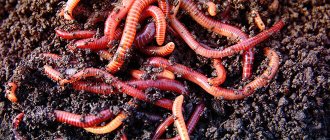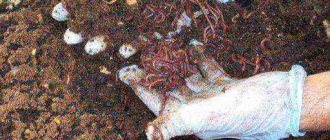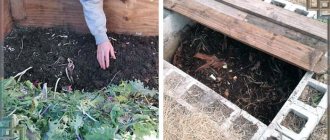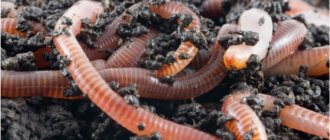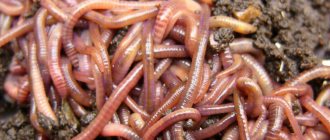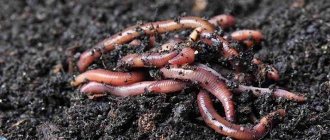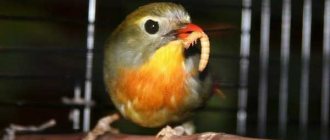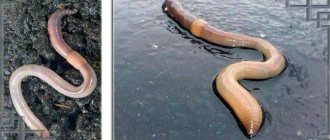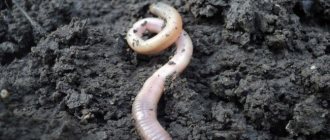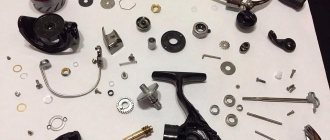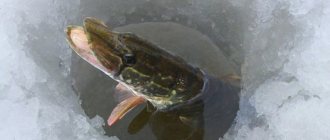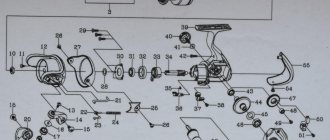Benefit
Earthworms, or earthworms, are very useful: by digging their tunnels along the roots of plants, they loosen the soil, helping the roots to breathe and be supplied with the necessary substances. This happens due to the fact that, along with rotting leaves, our heroes absorb many specific bacteria. As a result, they leave new soil granules in the soil that contain humic substances. They absorb moisture well, making the soil more fertile and breathable. In this way, earthworms help complete the cycle of substances in nature - this is a very important and useful process.
Photo: Still from the cartoon “Journey of the Earthworm”
What to feed earthworms at home in the kitchen and toilet?
Let’s be clear right away - earthworms are far from vegetarians, but seasoned predators - feed them live bacteria and microbes from spoiled kitchen products, so any rotting organic matter will be suitable as food.
However, let's start by answering three very interesting sub-questions.
- Why feed earthworms at home?
- What do these worms eat in nature?
- What do all the worms especially love?
Why feed earthworms at home?
There are several very good reasons for this, not only saving our time, significantly saving and even replenishing the family budget, but also eliminating the extremely unpleasant question of whose turn it is today to stomp from the 5th floor to the trash can with a fragrant kitchen bucket?
- Food for indoor birds, fish, reptiles and animals
- To avoid taking out the trash can at all
- Avoid using the toilet at all, which means saving water
- The best deodorant
- Getting rid of midges on screens
- Natural disinfection
- For fishing bait
- Useful hobby
- For sale
This is how technological earthworms process feces at home.
What do these worms eat in nature?
Frankly speaking, most wild relatives live very hungry. In spring - rotted grass and leaves from last year, in summer and autumn - dead roots and rotting wood from fallen trees. And like a very rare delicacy - droppings and manure of wild and domestic animals, and if our brother sits somewhere in a forest or behind a bush.
And in winter, the natives of our dacha and garden lands and other lands simply sleep. And so, based on this, we will create a menu for our domestic underground workers. But given that the house is warm, the hard workers will create vermicompost from waste without hibernating and much better than the Stakhanovites:
- around the clock without sleep or rest;
- without regular and maternity leaves;
- no time off or absenteeism;
- without a hangover and sick leave - because in general they never get sick.
Moreover, each worm has an enviable, frankly, brutal appetite.
During the day, an individual eats an amount of food equal to its own weight.
A variety of foods that you don’t need to buy are suitable for your pet worm’s diet. At any time of the year, regardless of the region, every family has a lot of kitchen and other household organic waste every day.
But the worms do not have teeth and feed on the principle of a washing vacuum cleaner, as they say - only passionately. Therefore, absolutely all of our garbage is not quite suitable food for a small, for example, liter vermifactory . In such a small volume, everything should be in a mushy and very wet state. In addition, many clearings can be living and even growing, but our hornless domestic crawling cattle do not consume live plants at all. To feed earthworms, you need to first boil or freeze and thaw kitchen scraps, which can germinate and many leftovers are subject to this procedure.
Therefore, absolutely all of our garbage is not quite suitable food for a small, for example, liter vermifactory . In such a small volume, everything should be in a mushy and very wet state. In addition, many clearings can be living and even growing, but our hornless domestic crawling cattle do not consume live plants at all. To feed earthworms, you need to first boil or freeze and thaw kitchen scraps, which can germinate and many leftovers are subject to this procedure.
How to introduce earthworms
Change land management practices
If you don't have many earthworms in your soil, consider some of the methods described above. It's amazing how quickly they accumulate under favorable conditions.
Move the pasture
Move pasture animals away from areas with high worm populations and move them to areas without worms. New colonies will form within a few years if they have plenty of organic matter and the soil and climate conditions are favorable.
It is important that you tolerate pastures and not just worms. Do not attempt to transplant compost worms into agricultural soils.
Species that thrive in compost will not survive in the harsher conditions of field soils that dry out near the surface.
Earthworms: the benefits of animals on the site
Quite a lot can be said about the benefits of earthworms. They are distributed almost everywhere, except in deserts and cold regions.
- They fertilize the soil with their feces.
- The moves loosen the layers and promote aeration.
- Dispose of plant residues.
- Their emissions hold the soil together and cracks do not appear on it.
- Worms transport minerals from the lower layer of soil, thereby renewing the soil.
- Plant growth improves. It is easier for the roots to penetrate into the passages made by the worms.
- They create a lumpy soil structure and improve its adhesion.
Varieties of annelids
The most common common representative of bristle annelids is the earthworm. But it is they, which are freely found in nature, that are least suitable for reproduction in artificial conditions. Representatives of this subspecies reproduce rather slowly, have difficulty adapting to new conditions and unfamiliar food, and live relatively short lives. They are, perhaps, only suitable for breeding for your own personal household needs.
For industrial breeding and production of vermicompost, the Russian scientist, Professor A. M. Igonin bred a special breed “Staratel”. By crossing different breeds of species living at a sufficient distance from each other, he was able to obtain individuals with completely new qualities:
- long life expectancy - from 4 to 16 years;
- reproduces quickly;
- easily tolerates changing food (any type of food can be used - from fallen leaves and grass to human food waste).
Another variety that meets the requirements for industrial production is the red Californian worm. Individuals of KKCH also multiply very quickly, increase their useful mass, process various organic human waste into vermicompost, and serve as an excellent protein feed for agricultural and fish farming.
The prospector worm is the fastest reproducing individual. In 1 year it can produce offspring of 1500 worms
Holes are drilled in the top of the box or lid. The structure is installed at a slight angle in order to drain the vermichain formed during the life of the worms through a hole drilled in the bottom. An old refrigerator can act as a worm trap. It is placed with the doors facing up, holes being drilled in advance.
Why do earthworms come out after rain?
After rain, you can see a large number of worms on the asphalt and soil surface, what makes them crawl out? Even the name “earthworms” indicates that they love moisture very much and become more active after rain. Let's consider several possible reasons why earthworms crawl out to the surface of the earth after rain.
Soil temperature
It is believed that worms crawl to the surface in search of warmth, since after rain the soil temperature drops by several degrees, which causes discomfort for them.
Changes in acid-base balance
Another theory says that the worms crawl to the surface due to a change in the acid-base balance of the soil after rain, it becomes more acidic, which negatively affects these diggers. According to researchers, emergency evacuation to the soil surface saves them from death in an acidic environment.
Lack of air
The third theory explains that after rain there is more oxygen in the top layer of the soil, so the worms crawl up en masse. Water enriches the upper layers of the earth with oxygen, and many species of worms love moisture and vitally need sufficient oxygen. And through the surface of the body, oxygen is absorbed best in a humid environment.
Trips
British scientist Chris Lowe suggested that worms crawl to the surface of the earth during rain in order to make a long journey to new territory. On the surface, worms are able to crawl much further than underground, and dry soil causes discomfort when moving, strong friction is created, and grains of sand stick to the surface of the worm’s body, injuring it. And after rain, the surface of the earth is highly moistened, which allows them to freely travel to new areas of the ground.
Sounds of the rain
Another scientist, Professor Joseph Gorris from the USA, suggested that earthworms are frightened by the noise of rain, since the vibrations it creates are similar to the sound of the approach of their main enemy, the mole. That is why some fishermen use a technique to lure bait to the surface: they insert a stick into the ground, attach a sheet of iron to its surface and pull it so as to create a vibration, which will be transmitted into the ground through the stick. When frightened, the worms climb to the surface of the earth and become easy prey for experienced fishermen.
Where do they prefer to live and eat?
Most worms choose soil rich in humus, under last year's leaves, as their habitat. They feed on rotten fragments of vegetation and rotting organic matter. Undigested food, which contains a significant portion of small earthen particles, is deposited on the soil surface. On one hectare of land, the number of earthworms can be more than four million. In a day, one feeding worm can process approximately half a gram of earth.
With their small size but significant numbers, puffballs process most of the fallen leaves in the forest. For example, if you spread out all the processed, fertilized soil, a layer of about one centimeter will come out. Particularly as a result of this, they are rightly considered invaluable transformers of the earth.
Worms prefer soil that contains a lot of humus. In nature, it feeds on various plant remains, mainly rotten leaves. The worms take them with them when they dive into their burrows. If you are wondering what they feed puffballs on large vermifarms, then this is no secret. They are fed humus and food from old leaves and branches.
What is indisputable is that by “storming” a huge number of holes, the worms loosen the soil, which facilitates the flow of oxygen into it, and also enriches it with nutrients. As a result, yields are significantly improved.
Summer residents, noting the invaluable benefits of these small animals, try to treat them carefully, creating favorable living conditions for them and increasing their numbers in the garden.
Are earthworms dangerous for people and pets?
Despite all its beneficial properties, the earthworm can pose a threat to many animals. It is a carrier of parasites. It should be borne in mind that no cases of human infection through earthworms have been identified. This invertebrate can cause infection only if it enters the body.
An earthworm can be a temporary host for the following parasites:
- Syngamidae. It poses a threat to many bird species, including domestic birds. Once in the respiratory tract of an animal, it causes attacks of suffocation, which often leads to the death of the owner. Most often, death is seen in young individuals. The disease caused by these parasites is called syngamosis. Turkeys and starlings are especially affected by it.
- Metastrongylids (Metastrongylus). This parasite develops only inside pigs and is the causative agent of a dangerous disease - metastrongylosis. Causes respiratory dysfunction and also poisons the host's body. Often leads to the death of piglets.
- Capillaria nematodes. It is the causative agent of capillariasis and poses a serious threat to birds. This disease is extremely similar to syngamosis.
- Porrocaecum crassum nematodes. It parasitizes the small intestine of some waterfowl. Causes porrocecosis. Death occurs due to blockage of the intestine and rupture of its wall. The disease most often occurs in young animals. Porrocecosis is extremely dangerous for ducks.
Less commonly, earthworms are temporary hosts for some species of tapeworms. However, in most cases they do not pose a significant threat.
It is important to understand that exterminating earthworms is not a solution. It is necessary to fight against the parasites themselves that have gotten inside domestic animals, and you also need to monitor the condition of pastures.
Earthworm: Questions and Answers
Are worms harmful to humans?
No. Earthworms don't bite anyone because they don't have teeth. Their skin needs to be moist to breathe. This is because earthworms breathe through their skin.
Where do earthworms live?
Earthworms and their relatives live anywhere there is moist soil and rotted plant material. Earthworms are most common in rain forested areas, but they can be found in many terrestrial and freshwater habitats. All types of earthworms require moist soil to survive.
What do earthworms do?
Worms help increase the amount of air and water that enters the soil. They break down organic matter such as leaves and grass into items that plants can use. When they eat, they leave behind castings, which are a very valuable type of fertilizer - vermicompost.
Do worms feel pain?
Worms and crayfish do not feel pain. Most invertebrates, including lobsters and crabs, do not feel pain because, unlike mammals, they do not have large brains to read signals.
How do worms die?
If the worm's skin dries out, it will die. Once on the sidewalk, worms often become disoriented and cannot return back to the soil. They then dry up and die when the sun comes out.
How many years do earthworms live?
The lifespan of an earthworm depends on the species. Various experts report that certain species can live 4-8 years.
Why does the worm have 5 hearts?
While earthworms may seem simple because they don't have many visible external organs, they do have complex internal organs, including five pairs of heart structures called aortic arches, which they use to pump oxygenated blood to the rest of the body.
What can kill earthworms?
Currently, only one readily available insecticide is known to reduce and eliminate earthworm populations. Sevin, a carbale-based product, is intended to kill grubs in your lawn, but it has also been found to reduce earthworm populations when used at recommended grub dosages.
Are earthworms good for you?
Earthworms act like tiny plows when they live in the garden. As earthworms move through garden soil, they create tunnels. And produce all the important nutrients that help garden plants grow and stay healthy.
Do worms sleep?
Inside the soil, earthworms form a mucus-lined chamber in which they curl into a tight ball to prevent moisture loss. They remain in these chambers until more favorable soil conditions are reached. If earthworms "sleep", it must be at times when all other behavior ceases.
Can earthworms carry diseases?
We already know that worms contain bacteria that cause human disease (pathogens). Pathogens we know are carried by worms include E. coli O157 and Salmonella. These bacteria can cause serious gastrointestinal infections in humans and are usually found in soil.
Are earthworms safe to eat?
The short answer is yes. They can be eaten raw or cooked, especially for young children who are invariably drawn to earthworms.
Can earthworms live in water?
Earthworms cannot drown like humans can and can even survive for several days completely submerged in water.
Do worms survive when cut in half?
If an earthworm splits in two, it will not become two new worms. The worm's head can survive and regenerate its tail if the animal is cut. But the worm's original tail will not be able to grow a new head (or the rest of its vital organs) and will die instead.
Do earthworms have teeth?
The worms have strong, muscular mouths but no teeth. They eat many different foods and prefer decaying plants.
Does salt kill earthworms?
Because of its porosity, earthworm skin is not an effective barrier against fluid loss, unlike human skin. If you sprinkle salt on an earthworm, the high concentration of salt causes water loss through osmosis. As a result, the earthworm very quickly becomes dehydrated and dies.
How quickly do worms reproduce?
When conditions are right, your red worm population will multiply quickly. Mature worms (3 months old) can produce two to three cocoons per week. Each cocoon consists on average of three young. It takes up to 11 weeks for the cocoons to mature and hatch.
Do worms have gender?
Earthworms are hermaphrodites: each worm has male and female reproductive organs.
Do worms eat rice?
Bread, rice and beans can ferment, which can reduce oxygen or create odors that you and your worms don't like.
Do worms eat dead worms?
If you find a lot of dead worms, you should find out the reason. High temperatures (above 40 degrees) are detrimental to them. Too much salty or acidic food waste can kill them.
Do worms die when it gets cold?
Although worms cannot survive freezing temperatures, they lay eggs, which are encased and protected by very small cocoons. They can survive the winter by turning into tiny worms when temperatures warm up again.
Do worms have 9 lives?
There are about 3,000 different species of earthworms. Worms live where there is food, moisture, oxygen and favorable temperature. If they don't have these things, they go somewhere else. One hectare of land can contain more than a million earthworms.
Do worms die of old age?
All animals in the world gradually age with age and eventually die. Not only is a flatworm capable of regenerating its old, dead cells, but it can literally grow a new brain, intestines, or tail when split in two.
What will kill earthworms?
Since earthworms need moisture to breathe, the acidity of the vinegar will cause moisture to leave their bodies, which can lead to their death. However, it can be difficult to kill earthworms with vinegar alone. If you spray on the lawn where you are trying to get rid of worms, you will also kill the grass.
Do worms eat hair?
You raise an interesting topic, and the short answer is: Yes, worms can feed on hair and process it into vermicompost. Basically, worms love hair. Worms feed on almost anything that is organic material.
Do earthworms damage plants?
Earthworms and composting worms are very useful for growing plants in soil in your garden, and although one or two earthworms may cause little or no damage to a potted plant.
What to feed the worm at home?
If you are not aware of what earthworms eat at home and what diet they need, then the following information is just for you. After all, it is necessary not only to create optimal living conditions, but also to provide the necessary nutrition for these individuals. Consider the food that can be used for an earthworm:
- Food waste (shells, peelings).
- Horse or goat manure.
- Tea leaves, coffee grounds, leaves, grass.
It is worth paying attention to what earthworms feed on and what is unacceptable for them. You need to know that the manure for feeding should not be fresh, but rotted, otherwise the worm will simply die. All this is due to the large amount of ammonia, which is found in fresh manure and is very harmful to your pets. There is no oxygen in an ammonia environment, so sometimes individuals die.
